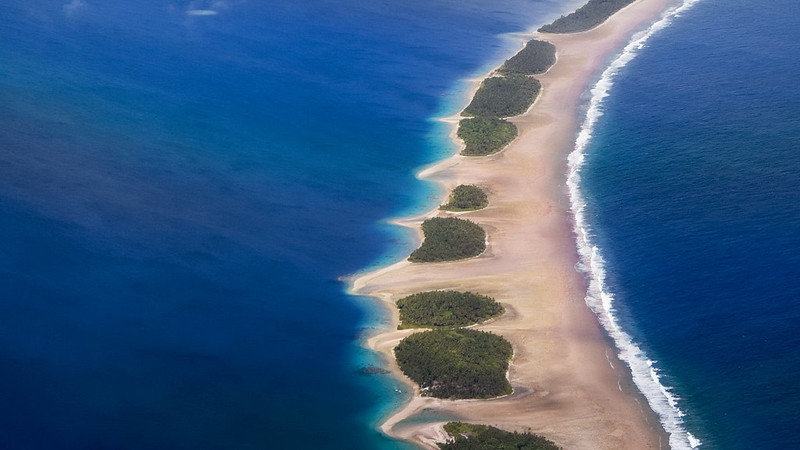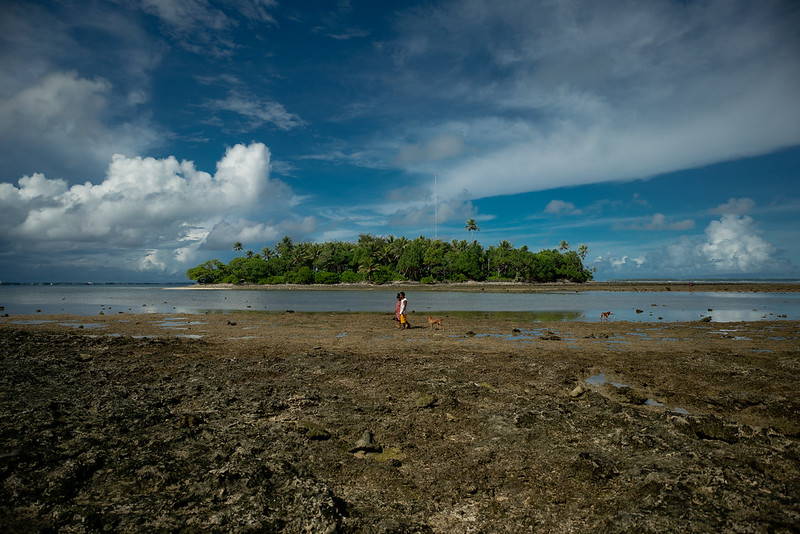How fighting climate change helped Marshall Islands avoid COVID-19
The Foreign Minister and the Environment Minister of the Republic of the Marshall Islands explain how the nation’s battle against rising seas and extreme weather influenced its prompt pandemic response.
W
hile Covid-19 has now been confirmed in over 200 countries, here in The Republic of the Marshall Islands, we remain one of a diminishing number of countries that have prevented the virus from reaching our shores.
An aerial view of the downtown area of Majuro Atoll, the capital of the Marshall Islands, which has been hard hit by a dengue outbreak. Photo: Marshall Islands Journal
The reason? Because our frontline battle with climate change has shown us all too well that for threats of this scale, bold and early action is our best chance of survival.
This week, the High Ambition Coalition (HAC) – a group of states committed to the highest possible climate action – met virtually. The Marshall Islands formed the HAC in the run-up to the Paris Climate Conference in 2015, where it was instrumental in securing an ambitious Paris Agreement, including a 1.5C warming target, five-year greenhouse gas reduction target increases, and a net zero global emissions pathway.

The Marshall Islands are a sprawling chain of volcanic islands and coral atolls in the central Pacific Ocean. Photo by Keith Polya/ Flickr
In this week’s meeting, the urgency was clear. Trillions of dollars will be spent on stimulus packages to aid recovery from the Covid-created economic decline.
How that money is spent will determine our collective future. Done right, recovery can catalyse systemic changes that will set us on track to meeting the goals of the Paris Agreement. Done wrong, we lock ourselves into a carbon-dominated future where preventing runaway climate change will be impossible.
Our fellow ministers underscored the importance of fiscal and monetary policies that can drive deep decarbonisation, and called for political cooperation and solidarity between developed and developing states. They called for bold action to ensure that developing countries have the resources and support they need.
Ministers noted that Covid-19 recovery also presents an opportunity for countries to live up to their commitments under the Paris Agreement, and to come forward with ambitious emission reduction commitments, known as “Nationally Determined Contributions” (NDCs), that align with their recovery packages. Countries agreed in Paris to update these commitments every five years to increase their targets to reduce greenhouse gas emissions.
NDCs are the mechanism through which countries agreed every five years to increase their targets to reduce greenhouse gas emissions. The first of the five-years cycles, 2020, is a testing year for the Agreement.
Even with the UN’s climate conference, COP26, postponed to November 2021, we cannot allow the submission of improved targets to be delayed until then. Our future depends on it.
The devastating effects of climate change have become a constant companion in our lives here in the Marshall Islands. With each king tide or storm, we look to our shores with trepidation – our average elevation is just six feet (1.8m) above sea level.
Most recently, we’ve battled the worst outbreak of Dengue fever in our history. Like Covid-19, dengue fever is increased in its likelihood by climate change, which has given the mosquitos that carry the fever ever-increasing regions in which they can thrive.
These vulnerabilities have driven us to act and to lead by example: we are one of just 10 Parties to the Paris Agreement that have submitted our updated 2020 NDC.
Urgent action is a hallmark of our decision-making because of the threats we face. As Covid-19 spread quickly, we knew there was no time to lose. We banned all inbound visitors on 8 March. So far, we have not had any cases.

There is only so much Marshall Islands can do to protect itself against climate change. Photo by Asian Development Bank
Bold actions come with costs. While these restrictions have kept us safe, we have already begun to experience delays in the supply of much needed food imports and necessities. Whole industries have been brought to a halt. The continued health of our people proves this was the right move, but it has not been easy.
Covid-19 and climate change have a great deal in common: they are both indiscriminate killers; if tackled inadequately or too late, each can destroy our way of life permanently; and they both require urgent, bold action – on a global scale.
In the case of climate change though, there is only so much we can do here in the Marshall Islands to protect ourselves. We can’t close the border on the rising seas or the temperature of the planet. Instead, it’s the political will (or lack of it) of the big emitters at the UN’s climate change conferences in Paris, Madrid and Glasgow that will determine the severity of storms that hit our shores, the reach of illnesses like Dengue fever in our region, and ultimately, our country’s survival. Our future depends on the world’s largest economies coming together to turn targets on paper into real action.
The global transformation that is called for will require seismic shifts across sectors – from energy, to transport, to agriculture. Changes will have to be coordinated between governments and across continents, even in the face of increasing physical barriers. But Covid-19 has also shown us some of what is possible in terms of spending and cooperation.
Covid-19 has also shown us the consequence of combating a global catastrophe with inadequate preparedness, insufficient investment, and delayed mitigation. The disruption, restrictions, economic damage and joblessness that we are witnessing now are a window into a future that fails to prevent the climate emergency from becoming an even greater climate catastrophe. There is no excuse for being taken by surprise: we know what is coming and we have for a long time.
We have to invest now to protect our collective future. In the past, political leaders have balked at the investment required to create a sustainable economy. And they have feared the disruption and political consequences of restructuring economies around sustainable energy. But these concerns are no longer valid. Covid-19 has already disrupted and indeed devastated economies. Joblessness is especially high. There will certainly need to be concerted stimulus packages to ensure recovery from Covid-19. Those packages should aim to transform a devastated global economy into a green economy. Investing in climate solutions will stimulate the economy and create jobs, fueling a long-term, resilient recovery.
Covid-19 has cost so many lives, torn families apart, disrupted our way of life, put people out of work, and cost us trillions. These devastating losses must not be in vain. We now have a chance to use the recovery to transform our world and protect us from the looming climate nightmare. It would be foolish, irresponsible and negligent to forgo this opportunity: we’re going to spend a lot of money on the recovery; let’s spend it right.
We are a voice from the front line, and our warnings have gone ignored for too long. In the current pandemic, we are all relying on the expertise of scientists to guide us through the crisis. We are also listening to and relying on the doctors and nurses fighting this disease in emergency rooms and hospitals around the world. There is another front line created by the climate crisis. And, yet again, scientists are ringing alarms and providing guidance that is key to our survival. The people of the Marshall Islands are also on that front line, and we see first hand just how devastating it will be. A true recovery will require a global transformation unlike any we’ve seen in human history.
The ideas presented in this article aim to inspire adaptation action – they are the views of the author and do not necessarily reflect those of the Global Center on Adaptation.